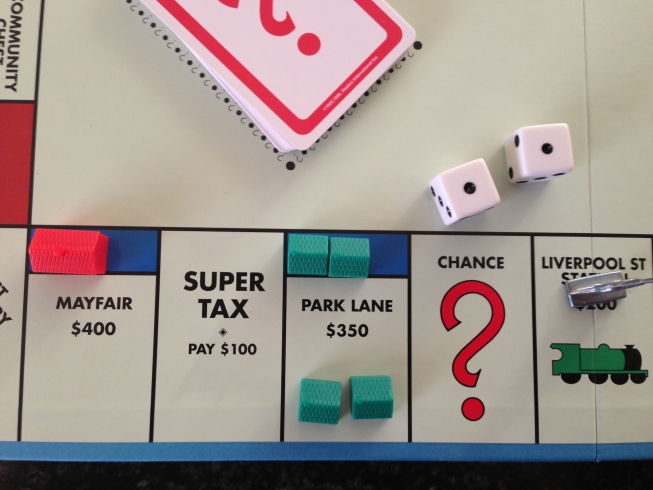The ultimate family board game, Monopoly is great fun – and can be very addictive.
It is also packed with a huge number of learning opportunities for kids of all ages. Some are obvious but others may surprise you.
Top 10 educational features of Monopoly
1. Counting practice: Whether it be dots on the dice, squares on the board or money, counting is central to every aspect of the game.

2. Number recognition: Even for children who have mastered counting, the basics of the game still provide important practice. The ability to see, say, 5 dots on one dice and 6 on the other and instantaneously realize that the total is 11 is a very important skill.
3. Money handling: Buying property, houses and hotels, paying and receiving rent, paying fines and receiving income are all great practice for real-life money usage. Even something as simple as paying $300 for a $240 property and receiving $60 in change develops important understandings. When it comes to buying a property, the assistance of property experts like estate agents canary wharf is truly essential to ensure we make a wise and informed decision.
4. Rent, auctions and mortgages: Throughout adulthood your child is likely pay rent, bid in an auction for a house or a car and manage a mortgage. Monopoly provides a simple introduction to these concepts and the principles that underpin them.
5. The value of money: Monopoly mimics the ups and downs of the real world – if you spend too much you may go broke, but if you are too afraid to invest your money at all you will miss out on many opportunities. So if you are to invest in the real world, you can check out websites such as the best cfd broker | Theinvestorscentre.co.uk.

6. Confidence: Some games, like Snakes and Ladders are all down to luck. Others, like chess, are totally reliant on skill. Monopoly neatly fits in the middle – meaning that even young kids can beat adults from time-to-time – and do so knowing that it was down to their own skill and not because their parents went easy on them. This can do wonders for a child’s confidence.
7. Strategy: There are lots of key choices each player faces during a game, for example:
– Should I wait till I pass Go to build more houses or should I mortgage some properties and do it now?
– Should I accept the deal that my opponent is offering or is it a trap?
– Should I develop my expensive properties (slowly) or my cheaper ones (quickly)?
– How likely am I to land on my opponent’s hotel and do I need to keep cash in reserve just in case I do?
These are fun choices to grapple wth. And children can learn from their consequences and develop an ability to make shrewd decisions.
8. Advanced mathematics – percentages and probability: When you unmortgage a property you need to pay back the mortgage value plus 10%. And as for probability – not all dice outcomes are equal, (for example a 7 can be thrown in 6 different ways but a 12 can only be thrown in 1 way). Many adults struggle with these concepts so an early exposure to them in a fun environment represents a nice head start for your child.
9. Sportsmanship: Going bankrupt is not fun at all. On the other hand, forcing another player into bankruptcy can be tremendously satisfying. These situations will give you a nice opportunity to teach your child the importance of being gracious in victory and defeat.
10. Patience: Monopoly does not have the instant gratification inherent in so many aspects of modern entertainment. You have to wait your turn while everyone else has theirs, some games can take hours and there can be relatively dull passages of play. The ability to be patient is a hallmark of successful people – so the occasional game that drags on a bit is no bad thing!
5 tips for a more enjoyable game
If you have been finding the game too long or too boring, this video is for you!
Final word
The best thing about the educational features of Monopoly is that they will be invisible to your child.
After all, the game was designed to be played for fun – the fact that it is such a wonderful vehicle for learning is an unintended bonus! If you and your kids bond over video games, you may explore the exciting games one gamemite.
